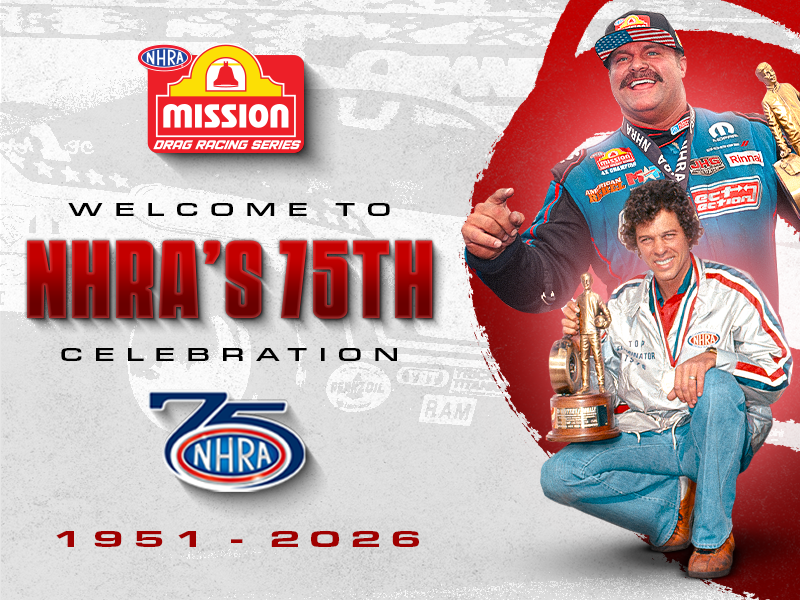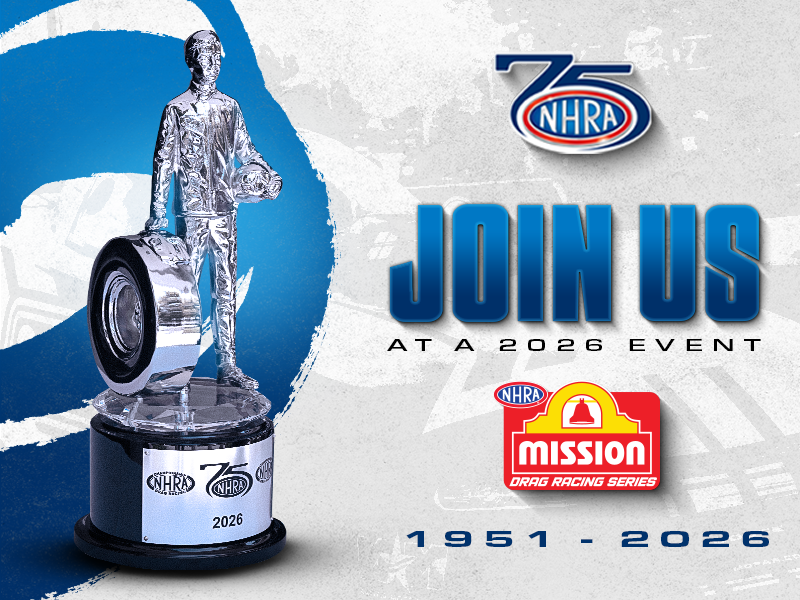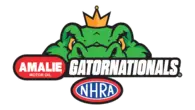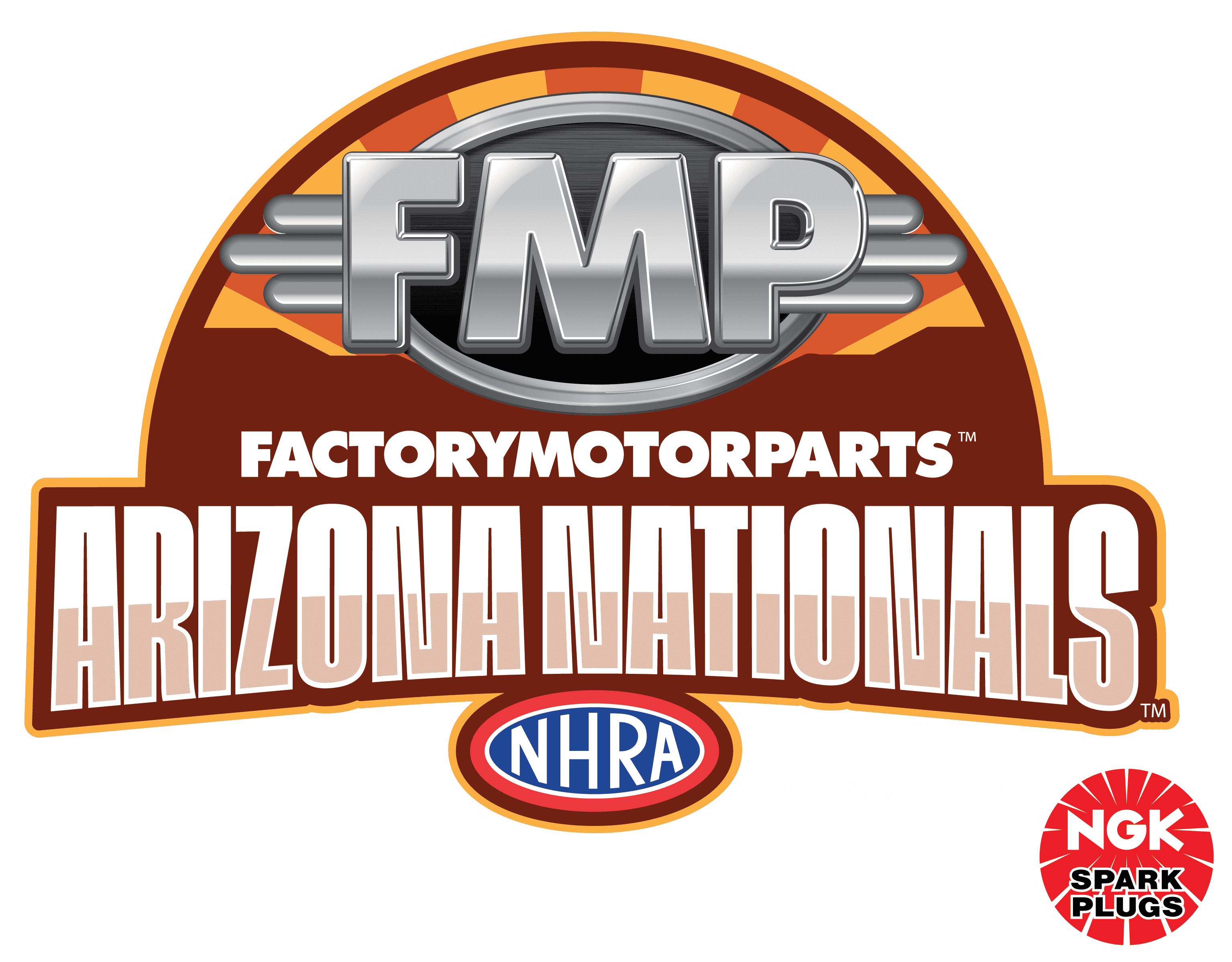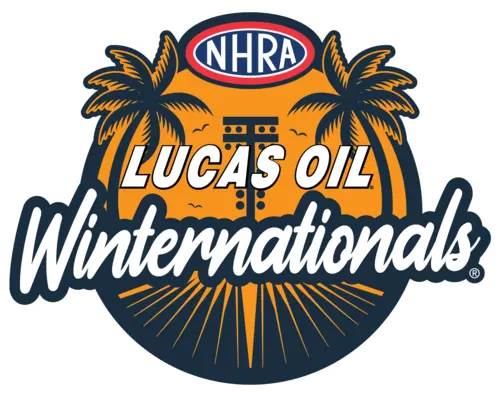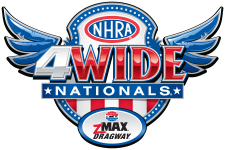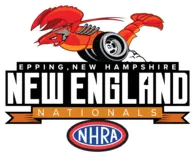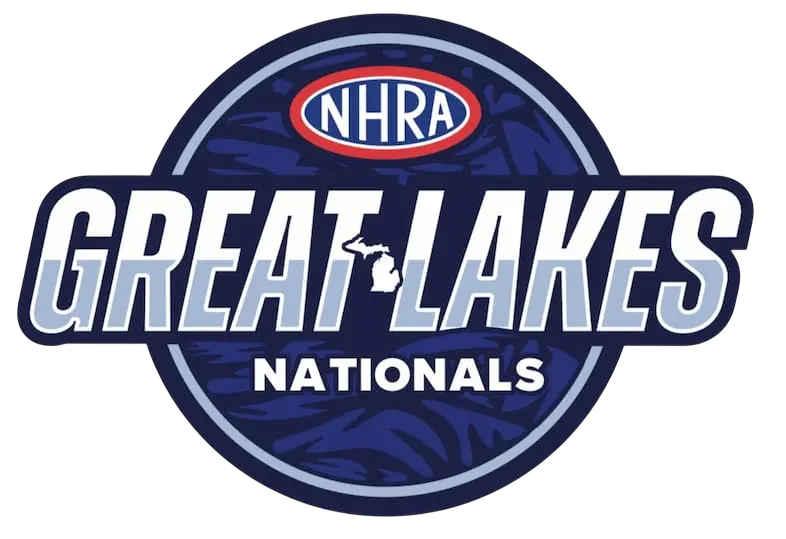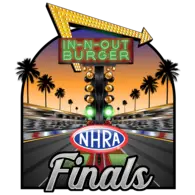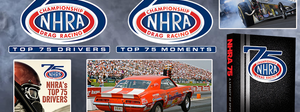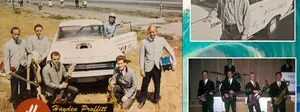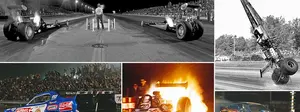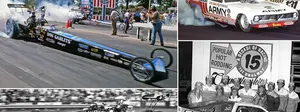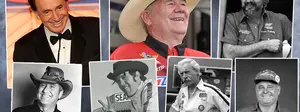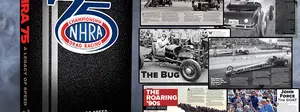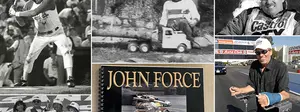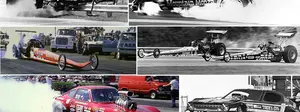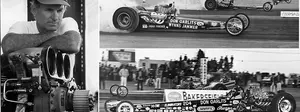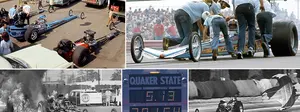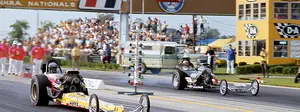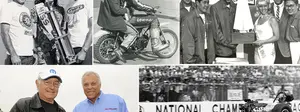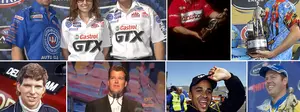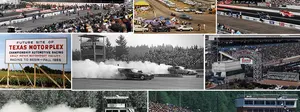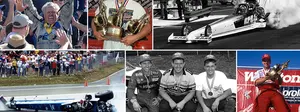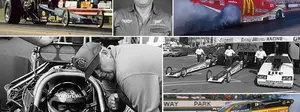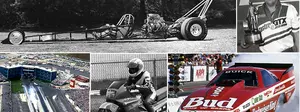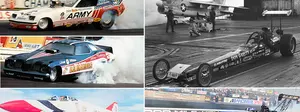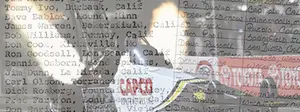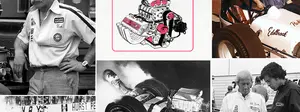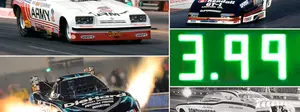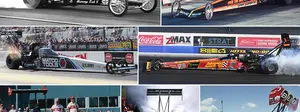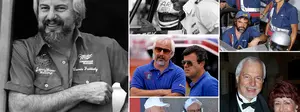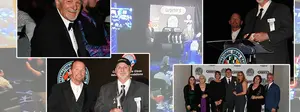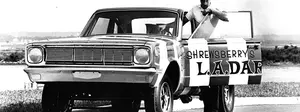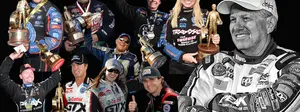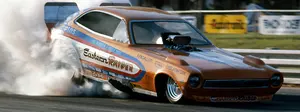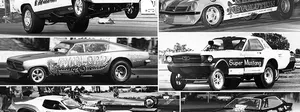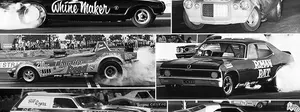Top Fuel turns 900
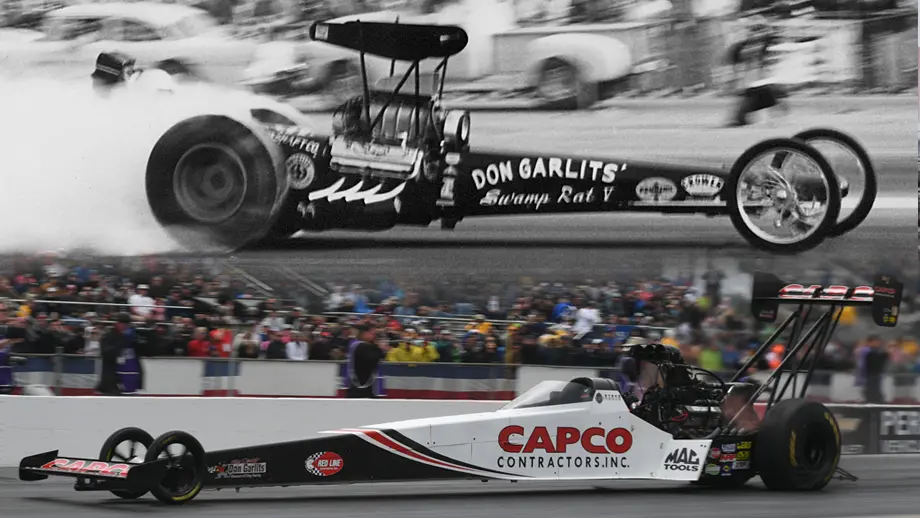

This weekend’s Dodge NHRA Nationals Presented By Pennzoil at The Strip at Las Vegas Motor Speedway will mark the 900th NHRA national event to include the Top Fuel class, dating back to the 1963 Winternationals.
In the 56 years and 898 races since Don Garlits captured that first title, the class has changed and morphed, from tire-freewheeling front-engined, short-wheelbase slingshots that ran 190 mph to rear-engined, 300-inch-wheelbase 335-mph missiles that only smoke the tires when the tune-up is missed or mechanical gremlins creep in.
Although nitromethane has been fueling hot-rod engines since the early 1950s, the ’63 Winternationals was the first NHRA national event to include nitro cars coming out of the five-year “nitro ban” that spanned 1957-1962.

The fuel ban was launched in early 1957 after Emory Cook’s nitro-guzzling Cook & Bedwell dragster -– built around a 1,600-pound, 100-inch-wheelbase Scotty Fenn chassis powered by a 354-cid Chrysler with six Stromberg carburetors -– blistered the Lions Drag Strip timers with a 166.97-mph speed in February. Before that weekend, where Cook also ran 165.13 mph, the best speed ever recorded was 159.01 by Kenny Lindley, just five months earlier at the Nationals in Kansas City, Mo. The shocking escalation of speed led many tracks, and NHRA, to ban nitromethane as a racing fuel.
The lack of nitro didn’t stop legends like Garlits and Connie Kalitta from becoming superheroes on gasoline and when nitro returned for the ’63 Winternationals (but not the ’63 Nationals, which crowned the final gas-fueled Top Eliminator champion, teenage Bobby Vodnik, who upset Garlits in the final), the fan response was overwhelming and Top Fuel became a regular part of the NHRA show beginning at the 1964 Winternationals, which was won in heroic fashion by Jack Williams. Kalitta joined the fuel parade not long after the ’63 Winternationals.
Garlits’ Swamp Rat V, the first Top Fuel winner, featured a 120-inch wheelbase and a supercharged 392 Dodge powerplant and, most notably, an engine-mounted fiberglass wing — modeled after an upside-down small-aircraft wing — that had been the suggestion of Bruce Crower of Crower Cams fame, to combat the short-wheelbased car's tendency to move around at speed. Garlits built a newer, longer version of the car a month later but the wing struts collapsed on a run at Island Dragway, so he removed it and didn’t have another winged car until he added one to Swamp Rat 14, the first rear-engine Top Fuel winner, in 1971.
READ MORE: Front to back: The rear-engine transition, Part 1 and Part 2, and Top Fuelers of the '70s: The evolution

Garlits, still acknowledged by most as “the king of the dragsters” even though his records have long since been eclipsed, won the first (and his first) Top Fuel race and the third (1964 Indy) to become the class’ first two-time winner. Don Prudhomme beat him to three wins (1965 Winters, 1965 Indy, 1967 Springnationals) and by the time that Prudhomme won his fifth and final title of his first go-round in the class at the 1970 Nationals, he and Garlits were tied for career Top Fuel wins at five. When Prudhomme moved to Funny Car, Garlits had few challengers. (After 35 wins in Funny Car, Prudhomme would return to Top Fuel in 1990 and earn 14 more titles through trying times, tying him for 14th overall in class history.)
Garlits, who is widely credited with the first 200-mph run and for sure made the first 250-mph pass, notched his 10th win at the 1973 Supernationals at Ontario (Calif.) Motor Speedway and his 20th at the 1979 Fallnationals in Seattle. He spent a lot of time in the 1970s as the king of AHRA Top Fuel racing and didn’t run a lot of NHRA action until his fabled return at the 1984 U.S. Nationals, when the class was in crisis.

Shirley Muldowney, who had emerged as the face of NHRA Top Fuel in the 1980s, had been horribly injured in a high-speed wreck at Le Grandnational in Quebec and popular Doug Kerhulas’ career had ended just weeks earlier after sustaining serious injuries at the Springnationals. Car counts were way down -- the low point being a 12-car turnout for a 16-car field at that year’s Summernationals; there were 25 Funny Cars on hand -– with the defection of high-profile Top Fuel stalwarts like Candies & Hughes switching to Funny Car. IHRA even announced it would drop the Top Fuel class entirely for the 1985 season.
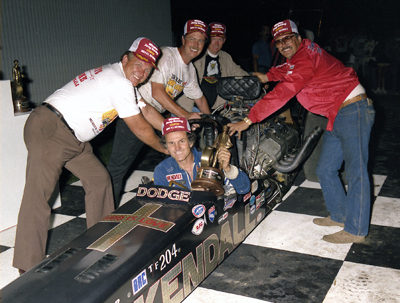
Garlits’ comeback in his aging Swamp Rat 26, with a financial assist from old pal Art Malone -– whom Garlits had beat in the final of the ’63 Winternationals -– at the 1984 U.S. Nationals, where the proverbial “old age and treachery” maxim played out in a Hollywood script, led to a renaissance in the class. Cragar announced a Top Fuel bonus program for 1985 and Charlie Allen staged the first successful Top Fuel match race in ages at Firebird Int’l Raceway in October. Garlits was back, and so was Top Fuel and his back-to-back championships in 1985-86 proved it.

Top Fuel in the early to mid-1980s was a tough place to race. In addition to Shirley Muldowney, who won three championships between 1977 and 1982, you had Gary Beck and the incredible Larry Minor dragster. Beck had already been a world champion back in 1974 in the Export A dragster and finished second in '75, third in '76, and fourth in '78. He joined with Minor in 1980 and was runner-up to Muldowney in the title battle, but was just getting started. After finishing second behind Jeb Allen in 1981, his Bernie Fedderly-tuned dragster recorded the four quickest elapsed times of 1982, including the first 5.4-second pass, then made 16 of the 1983's 17 quickest passes, including the first two runs in the 5,30s en route to the championship.
READ MORE: Top Fuel domination, 1983-style

Garlits wasn't the only one making a comeback in the mid-1980s as '60s Top Fuel star Eddie Hill returned to the asphalt world after conquering the world of nitro-fueled drag boats. Even though he returned in 1986, he didn't win his first of 13 national event Wallys until 1988 -- the same year that he became the first Top Fuel racer to run a four-second elapsed time -- and won the championship in 1993. Throughout the late 1980s and early 1990s, Hill and his team -- which included wife Ercie, red-bearded crew chief "Fuzzy" Carter, and their traveling menagerie of pets -- including "Hot Dog" the dachshund and "Monkey Bat" the cat -- were as popular as any team out there with their bright-yellow dragster, dubbed "the Nuclear Banana."
Garlits won his 35th and final Top Fuel Wally at the 1987 Winternationals and he remained the class’ all-time win leader for nearly a decade afterward until Joe Amato won his 36th at the 1996 World Finals and became the first Top Fuel racer to amass 40 Wallys the following year in Topeka.
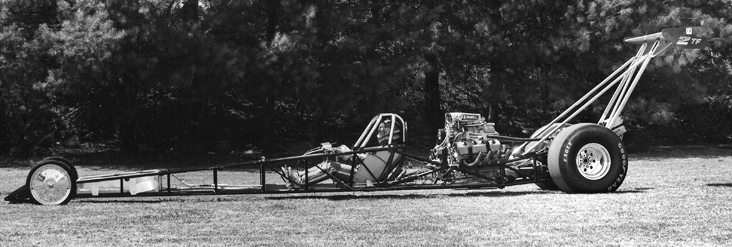
Amato, who had won the championship in that tumultuous 1984 season and set the Top Fuel aero world on its ear with his high-winged, Tim Richards-tuned TRW dragster, also would go on to eclipse Garlits’ record three world championships by winning his fourth of five titles in 1991. At the Reading event in 1999, he became the first to reach 50 wins in the class and ended his career with 52 Top Fuel trophies on the shelf. The aero awareness that Amato and Richards brought to the class led to a new interest in the topic and helped birth streamliners like the Gary Ormsby Castrol entry, Don Garlits' Swamp Rat XXX, and a Bud streamliner for Darrell Gwynn.
READ MORE: Top Fuel streamliners
Kenny Bernstein also established himself as a force after he returned to his Top Fuel roots in 1990 after winning four Funny Car world championships and 30 national events titles. He collected 39 Top Fuel trophies and two championships. His first, in 1996, made him the first to win season championships in both nitro categories, and, of course, he became the first driver to eclipse 300 mph at the 1992 Gatornationals. Bernstein’s son, Brandon, followed him into Top Fuel in 2003 and scored an impressive 19 victories in the class.
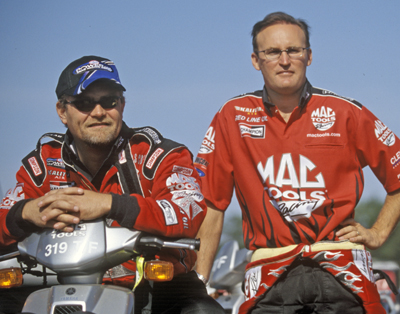
The new wave of young Top Fuel pilots like Brandon Bernstein arguably began with Scott Kalitta in the early 1980s -– even as his famed father was still running hard -– and included other second-generation drivers like Darrell Gwynn, Larry Dixon, and Tony Schumacher. Kalitta enjoyed amazing success in the mid-1990s with back-to-back titles in 1994-95, filling the void left by the retirements or limited duty of 1970s class heroes like Garlits, Muldowney, Gary Beck, and Dick LaHaie (who became Scott’s crew chief). Scott’s cousin, Doug, would also enter the fray in 1998 and carve an impressive career with 46 wins to date that ranks him fifth all-time in the class’. Kalitta is the class’ leader in starts with 511, which means that he has competed in 57% of the 899 Top Fuel events (including the two before he was even born).
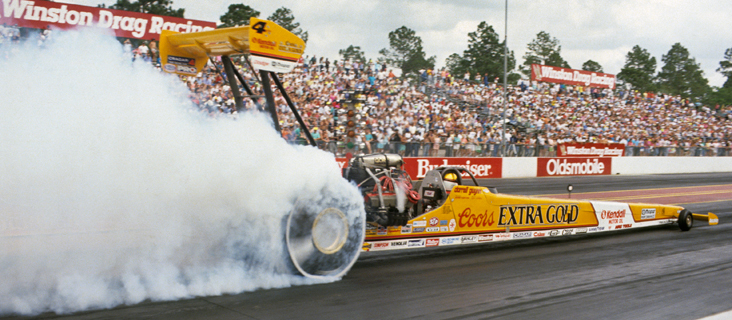
Darrell Gwynn emerged in the mid-1980s right as Garlits was making his comeback and the two Florida rivals went at each other relentlessly. Garlits dubbed Gwynn "the wolf" because he was hungry, and he took the measure of Garlits on several occasions. Gwynn, who had won the Alcohol Dragster champion in 1983, took to nitro quickly with his family-run team and scored 18 wins between the 1986 Winternationals and the 1990 Gatornationals before his meteoric career ended in a devastating crash during an exhibition in England in April 1990.
Just as when Garlits nabbed his 35th and final title Amato only had seven wins, when Amato finished with 52, Tony Schumacher, the heir to all future Top Fuel records, only had five of his current 84 trophies that he collected in less than 20 years of racing and Larry Dixon just eight of the 63 he would accumulate between 1995 and 2011 as the class’ second most prolific winner.
Schumacher became the second Top Fuel driver to reach 50 wins at Brainerd in 2008 and supplanted Amato as the class’ all-time winner with his 53rd victory later that season. He reached 70 wins in 2013 and 80 Wallys in 2015, fueled by an amazing win percentage of nearly 17% of the events for which he qualified (84 of 496), or a win in nearly one of every five raceday starts.
In 2008, his sixth championship broke Amato’s record and he went on to win two more. That season, he set still-standing records for most victories in a season (15), most final-round appearances (18, of 24 events), most consecutive event wins (seven), most consecutive finals (11), and most consecutive round wins (31). In 2012, his ninth U.S. Nationals win broke Garlits’ record, which had stood since 1986, and he added a 10th for good measure in 2016.
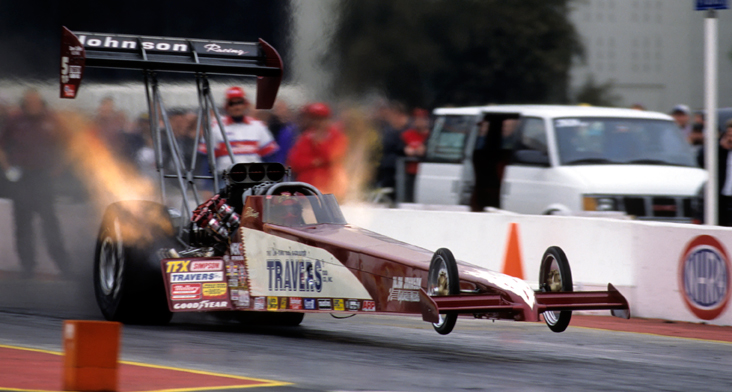
The success that Schumacher and Dixon achieved may have been measured had Blaine Johnson not lost his life in a qualifying accident at the 1996 U.S. Nationals which, ironically, was Schumacher’s first race and the two would have raced in round one if not for Johnson’s accident. Schumacher took a bye then went on to runner-up behind longtime Johnson family friend Cory McClenathan, who handed his winning trophy to Blaine’s brother, Alan. McClenathan, another bright star of the 1990s and early 2000s, accumulated 34 wins –- including twice at Indy -– in a career that will end in two weeks at the Auto Club NHRA Finals in Pomona.
The immense promise that the four-time Alcohol Dragster championship-winning Johnson brothers had shown in their brief Top Fuel career has played out for decades after as Alan became the architect behind Gary Scelzi’s success –- three championships and 25 wins in just four seasons -– and much of Schumacher’s success as well as that of future champions Del Worsham, Shawn Langdon, and Brittany Force, who all drove cars that were under the A.J. influence.
Force became the ninth woman to win an NHRA national event Top Fuel trophy and just the second to win a championship, with everyone, of course, following the tire tracks of Muldowney, who made history at the 1975 U.S. Nationals as the first female Top Fuel finalist, in 1976 as the class’ first winner (Columbus), and in 1977 as its first female champion. She would become a three-time champion and win 18 NHRA national event titles.
Twenty females followed her into the cockpit and eight others to the winner’s circle: Lucille Lee (1982), Lori Johns (1990), Shelly Anderson (1993), Cristen Powell (1997), Melanie Troxel (2006), Hillary Will (2008), Leah Pritchett (2016), and Force (2016).
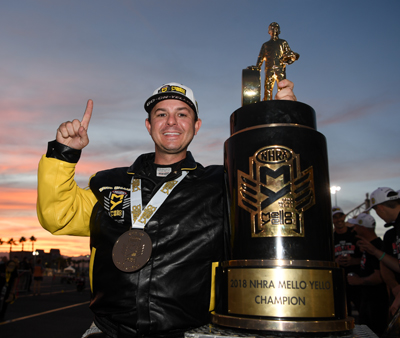
The third wave of Top Fuelers came in the middle/late 2000s, in the form of Antron Brown, who left the two-wheeled world of Pro Stock Motorcycle in 2008 and racked up 50 wins in just 11 seasons, and Steve Torrence, who launched in 2006 but didn’t start running fulltime until 2010, yet nonetheless became the latest to surpass “Big Daddy’s” once-unassailable total of 35 wins with a dominance of the class the last two seasons not seen since Schumacher’s heady mid-2000s run. Over the last three seasons, he’s scored 28 times and won 80 percent of his head-to-head races (169-42).
Already in 2019, we’re seeing yet another wave of talented young dragster pilots in Austin Prock, Jordan Vandergriff, Justin Ashley, Audrey Worm, and Josh Hart, who will help carry the class towards its 1,000th event, slated for early 2024. Be there!
FUN TOP FUEL STATS THROUGH 899 EVENTS
Number of different winners: 108
Number of different world champs: 30
First winner: Don Garlits
Winningest driver: Tony Schumacher (84)
Most starts: Doug Kalitta (511*)
Racers with 25 or more wins: 10
Racers with 10 or more wins: 26
One-hit wonders: 40
Winningest first name: Jim/Jimmy (5)
Drivers with wins in other classes: 32
NHRA TOP FUEL CHAMPIONS, 1964-2018* |
|
| Year | Driver |
| 1964 | Jack Williams |
| 1965 | Maynard Rupp |
| 1966 | Pete Robinson |
| 1967 | Bennie Osborn |
| 1968 | Bennie Osborn |
| 1969 | Steve Carbone |
| 1970 | Ronnie Martin |
| 1971 | Gerry Glenn |
| 1972 | Jim Walther |
| 1973 | Jerry Ruth |
| 1974 | Gary Beck |
| 1975 | Don Garlits |
| 1976 | Richard Tharp |
| 1977 | Shirley Muldowney |
| 1978 | Kelly Brown |
| 1979 | Rob Bruins |
| 1980 | Shirley Muldowney |
| 1981 | Jeb Allen |
| 1982 | Shirley Muldowney |
| 1983 | Gary Beck |
| 1984 | Joe Amato |
| 1985 | Don Garlits |
| 1986 | Don Garlits |
| 1987 | Dick LaHaie |
| 1988 | Joe Amato |
| 1989 | Gary Ormsby |
| 1990 | Joe Amato |
| 1991 | Joe Amato |
| 1992 | Joe Amato |
| 1993 | Eddie Hill |
| 1994 | Scott Kalitta |
| 1995 | Scott Kalitta |
| 1996 | Kenny Bernstein |
| 1997 | Gary Scelzi |
| 1998 | Gary Scelzi |
| 1999 | Tony Schumacher |
| 2000 | Gary Scelzi |
| 2001 | Kenny Bernstein |
| 2002 | Larry Dixon |
| 2003 | Larry Dixon |
| 2004 | Tony Schumacher |
| 2005 | Tony Schumacher |
| 2006 | Tony Schumacher |
| 2007 | Tony Schumacher |
| 2008 | Tony Schumacher |
| 2009 | Tony Schumacher |
| 2010 | Larry Dixon |
| 2011 | Del Worsham |
| 2012 | Antron Brown |
| 2013 | Shawn Langdon |
| 2014 | Tony Schumacher |
| 2015 | Antron Brown |
| 2016 | Antron Brown |
| 2017 | Brittany Force |
| 2018 | Steve Torrence |
| * From 1964 through 1973, the champion was the winner of the World Finals event; from 1974 forward, championships were determined by points | |
EVERY NHRA TOP FUEL WINNER |
|
| Driver | Wins |
| Tony Schumacher | 84 |
| Larry Dixon | 62 |
| Joe Amato | 52 |
| Antron Brown | 50 |
| Doug Kalitta | 46 |
| Kenny Bernstein | 39 |
| Steve Torrence | 36 |
| Don Garlits | 35 |
| Cory McClenathan | 34 |
| Gary Scelzi | 25 |
| Brandon Bernstein | 19 |
| Gary Beck | 19 |
| Shirley Muldowney | 18 |
| Spencer Massey | 18 |
| Darrell Gwynn | 18 |
| Scott Kalitta | 17 |
| Dick LaHaie | 15 |
| Gary Ormsby | 14 |
| Don Prudhomme | 14 |
| Shawn Langdon | 14 |
| Eddie Hill | 13 |
| Mike Dunn | 12 |
| Morgan Lucas | 12 |
| Doug Herbert | 10 |
| Connie Kalitta | 10 |
| Richie Crampton | 10 |
| Brittany Force | 9 |
| J.R. Todd | 9 |
| Jeb Allen | 9 |
| Del Worsham | 8 |
| Kelly Brown | 8 |
| Leah Pritchett | 8 |
| Rod Fuller | 7 |
| Darrell Russell | 6 |
| Billy Torrence | 5 |
| Pat Austin | 5 |
| Richard Tharp | 5 |
| Blaine Johnson | 4 |
| Ed McCulloch | 4 |
| Frank Bradley | 4 |
| Khalid alBalooshi | 4 |
| Lori Johns | 4 |
| Marvin Graham | 4 |
| Melanie Troxel | 4 |
| Shelly Anderson | 4 |
| Bob Vandergriff Jr. | 3 |
| Clay Millican | 3 |
| David Grubnic | 3 |
| Jerry Ruth | 3 |
| Jim Head | 3 |
| Gene Snow | 3 |
| Bennie Osborn | 2 |
| Blake Alexander | 2 |
| Dale Funk | 2 |
| Dennis Baca | 2 |
| Frank Hawley | 2 |
| James Warren | 2 |
| Larry Minor | 2 |
| Mark Oswald | 2 |
| Maynard Rupp | 2 |
| Mike Salinas | 2 |
| Mike Snively | 2 |
| Pat Dakin | 2 |
| Pete Robinson | 2 |
| Rob Bruins | 2 |
| Steve Carbone | 2 |
| Terry McMillen | 2 |
| Tommy Johnson Jr. | 2 |
| Arnie Behling | 1 |
| Art Marshall | 1 |
| Austin Prock | 1 |
| Bill Mullins | 1 |
| Bob Gibson | 1 |
| Bob Noice | 1 |
| Carl Olson | 1 |
| Chip Woodall | 1 |
| Clayton Harris | 1 |
| Cristen Powell | 1 |
| Dan Pastorini | 1 |
| Dave Chenevert | 1 |
| Dave Settles | 1 |
| Don Moody | 1 |
| Dwight Salisbury | 1 |
| Gerry Glenn | 1 |
| Hank Johnson | 1 |
| Hank Westmoreland | 1 |
| Herm Petersen | 1 |
| Hillary Will | 1 |
| Jack Williams | 1 |
| Jim Bernard | 1 |
| Jim Bucher | 1 |
| Jim Walther | 1 |
| Jimmy King | 1 |
| Jimmy Nix | 1 |
| Jody Smart | 1 |
| John Mulligan | 1 |
| John Wiebe | 1 |
| Johnny Abbott | 1 |
| Larry Dixon Sr. | 1 |
| Lucille Lee | 1 |
| Michael Brotherton | 1 |
| Rance McDaniel | 1 |
| Rick Ramsey | 1 |
| Ron Capps | 1 |
| Ronnie Martin | 1 |
| Stan Shiroma | 1 |
| Terry Capp | 1 |
| Tom McEwen | 1 |
Phil Burgess can reached at pburgess@nhra.com
Hundreds of more articles like this can be found in the DRAGSTER INSIDER COLUMN ARCHIVE



